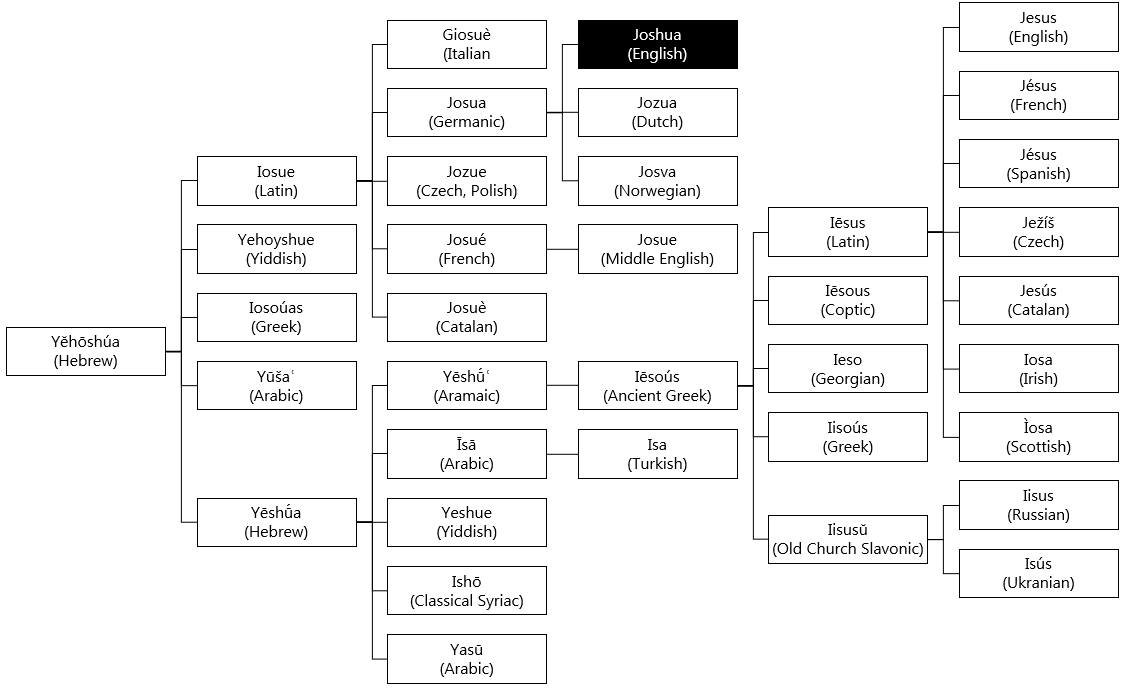
Joshua, your name is really cool! It means “YHWH will save.” It has a fascinating history because it entered into the European languages twice: once through Ancient Greek, and again when translators of the Bible started looking at older, closer to the original sources and retranslating everything. Basically, Joshua and Jesus are descended from the same name! And, all of the characters we know as Joshua today were known as Jesus (Iēsus) until these retranslations became in vogue.
We have two obstacles to get past when it comes to translating this name into Elven languages.
The first is that Elven names aren’t sentences. We can’t have a verb in the future tense. Or a verb. Verbs only exist in Elven names when they’ve been turned into adjectives or nouns first. I’m going to turn “will save” into the noun “salvation.”
The next problem is the Name within a Name. The name is also that of a deity. So, we have three options:
- Leave the name untranslated, just written how it’d be pronounced by someone speaking Sindarin or Quenya. The Jo- of Joshua come from the first letter of the Tetragrammaton, YHWH. This first letter was pronounced a variety of ways, since we don’t actually know how the name was supposed to be pronounced. In Joshua, it was originally pronounced Yĕhō, so we’ll base the pronunciations off of that.
- A roughly equivalent deity. There’s no perfect match since Judaism is a Monotheistic religion and the Elves’ deities are definitely Polytheistic. YHWH is supposed to be a creator god. The creating was spread out to all of the various Valar and their specific domains. The closest we can get to the deity that kicked everything off is Eru Ilúvatar, and I’ll use Eru in place of Yĕhō for those names.
- Translate the name within the name. This is hard because we don’t actually know what the name was supposed to mean. There’s a guess that it means “I am that I am.” From that meagre evidence we can make it mean “being” to fit in with the Elven naming system.
Quenya
Let’s start with what will be the second element of the name, “salvation.” In Quenya, the best match is “Rehtie– salvation, saving, rescue.”
Now for the difficult part.
- The Quenya pronunciation of Yĕhō would be *Yeho. It doesn’t sound like any existing Quenya words that we know of.
- Eru is the name of the deity, already in Quenya, so no change needed there.
- The word for “being” is Eala, though this refers only to the spirit, not to flesh.
Let’s put these together!
Gender-neutral or Feminine names: Yehorehtie, Erurehtie, and Ealarehtie.
Masculine names: Yehorehtio, Erurehtio, and Ealarehtio.
Of these names, none of them really make sense as an Elf’s name, despite how close in meaning they are to the original. For an Elf’s name, I’d change “will save” into the adjective “saved,” and keep the “Eala” and “Eru” translations, since you can name a deity’s name in your own if the name is describing your relationship to that deity. Thus, “Eru/Being Saved One.”
Gender-neutral (no name suffixes added): Erurehtaina and Ealarehtaina.
Masculine: Erurehtaino and Ealarehtaino.
Feminine: Erurehtaine and Ealarehtaine.
Sindarin
“Salvation, saving, rescue” is Edraith in Sindarin. As for the first element:
- Yĕhō would be pronounced *Ieho in Sindarin. There isn’t a word in Sindarin that it could be mistaken as.
- Eru is also called Eru in Sindarin.
- “Being” is Nas.
These names will all be gender-neutral, since compound names in Sindarin usually are.
Names: Iehoedraith, Eruedraith, and Nassedraith.
For characters in Middle-earth, these names are pretty weird. They sound more like the title of a story that’s been smooshed into one word than the name of a person. In Quenya, the “saved” approach works because long-winded names are common in Quenya, but Sindarin names are by in large much shorter. So, let’s drop the first part and make the names into “rescued one.”
For the gender-neutral name, we’ll use the adjective on its own: Nathannen.
Masculine: Nathannenor.
Feminine: Nathannenes, Nathannenel, or Nethennenil.
![]()
Joshua, I hope that you found this article interesting and useful!
If you’d like your name translated in this series, comment below and I’ll consider it for a future article!
Source:
Hanks, Patrick & Hodges, Flavia. A Dictionary of First Names Oxford University Press. 1990. pgs 177, 182.
Textus Receptus Bibles “John Wycliff Bible 1382” Accessed December 6th, 2021.
Wiktionary “Ἰησοῦς” Last Edited: October 19th, 2021.
Wiktionary “Joshua” Last Edited: September 23rd, 2021.
Wiktionary “יהושע” Last Edited: September 3rd, 2020.
Wiktionary “ישוע” Last Edited: Agust 12th, 2021.
